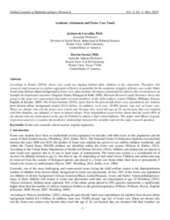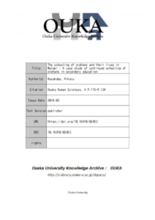Displaying 151 - 160 of 349
The aim of this research is to examine the relation between school attachment and school achievement and foster care placement.
Based on a large‐scale longitudinal study from Norway, this article examines early school leaving between ethnic minority groups and the ethnic majority in the child welfare population.
This research study proposes to explore aggregate of factors responsible for the academic struggles of foster care youth.
The objective of this study was to estimate the influence of out-of-home care on reading scores, attendance, and suspensions by comparing a matched sample of maltreated children who entered out-of-home care and maltreated children who remained at home.
The current study considers the educational experiences of unaccompanied immigrant children (UIC) in the Chicago metropolitan area from the perspective of diverse education, human service, and legal professionals that work with this population in Office of Refugee Resettlement (ORR) facilities, post-release, and community contexts.
This study used data from a large representative sample of child welfare investigations to answer the following research questions: 1) Do children with maltreatment histories and academic difficulties differ from those with maltreatment histories but no academic difficulties; and 2) Does the presence of academic difficulties influence ongoing child welfare services.
This study aims to observe the effect of structured education provided to improve self-esteem and hope on the self-esteem and the suicide probability of male adolescents living in orphanages.
This issue of the New Directions for Community Colleges journal is focused on higher education opportunities for foster youth.
In this paper, the authors outline key findings about the educational attainment of children and young people in care as identified by national and international research on this topic.
The purpose of this study was to investigate how orphans in secondary schools, especially those in the low-income class in society, manage to continue their education.


